Psychological Wellbeing of Turkish Migrants in London: Analysis
VerifiedAdded on 2023/06/07
|8
|2096
|398
Report
AI Summary
This report presents an analysis of factors influencing the psychological wellbeing of Turkish migrants in London. The study, based on a sample of 30 participants, investigates the impact of self-esteem, self-efficacy, language proficiency, financial status, and cultural adjustment on overall wellbeing. Data was collected through questionnaires, and statistical analyses, including ANOVA and reliability tests (Cronbach's alpha), were conducted to identify significant predictors. The findings reveal a significant relationship between self-efficacy and wellbeing, while language, finance, and culture showed less statistical significance. The report also discusses the challenges faced by Turkish migrants, such as language barriers and cultural adaptation, and provides insights into the interplay between these factors and their psychological health. The reliability tests highlighted the consistency of the data, with varying results across different variables, suggesting that while some aspects like language are consistently perceived, psychological factors are more subject to individual variations. The study concludes by emphasizing the importance of self-efficacy in the wellbeing of Turkish migrants and suggests further research to refine the understanding of these complex dynamics.
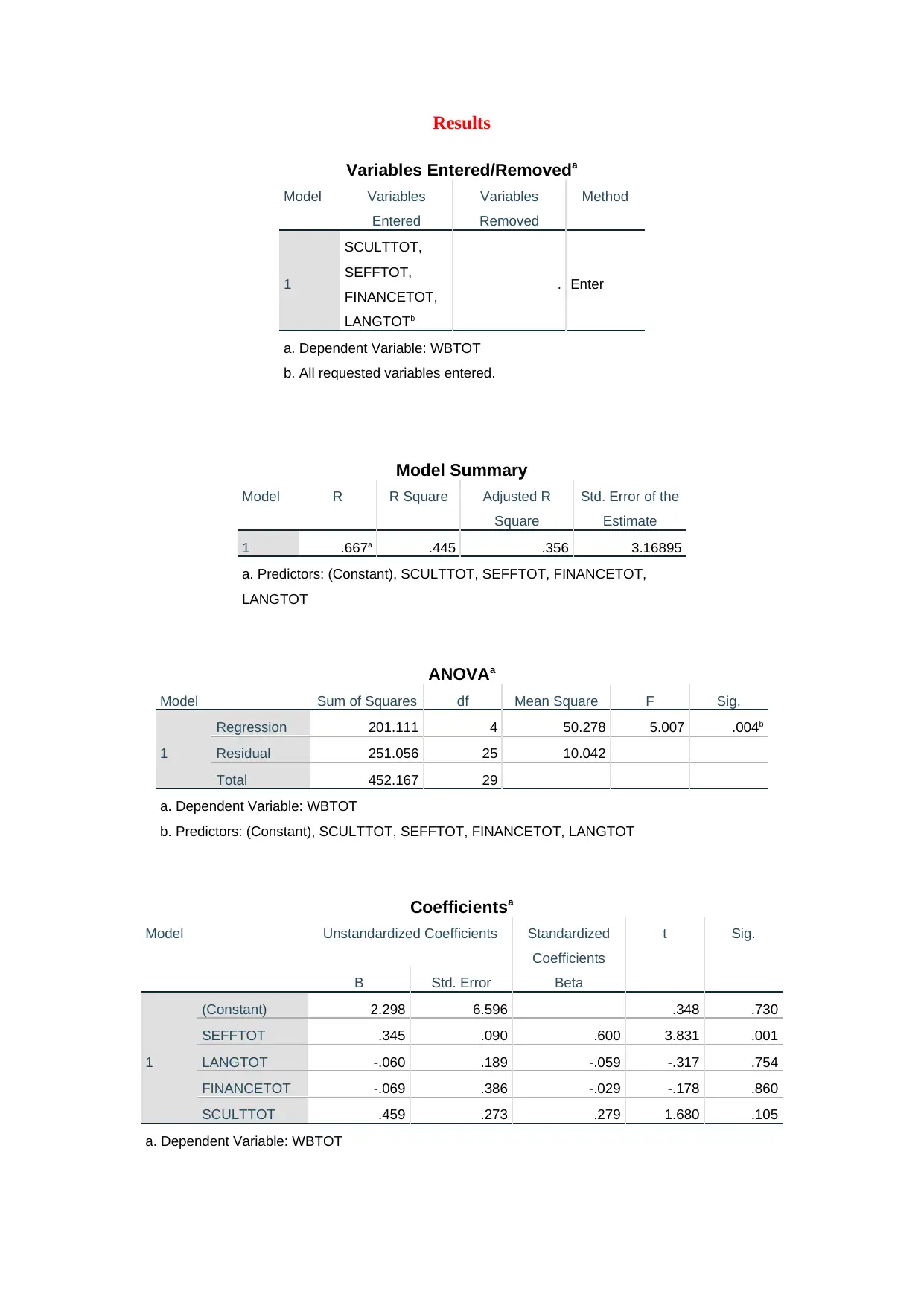
Results
Variables Entered/Removeda
Model Variables
Entered
Variables
Removed
Method
1
SCULTTOT,
SEFFTOT,
FINANCETOT,
LANGTOTb
. Enter
a. Dependent Variable: WBTOT
b. All requested variables entered.
Model Summary
Model R R Square Adjusted R
Square
Std. Error of the
Estimate
1 .667a .445 .356 3.16895
a. Predictors: (Constant), SCULTTOT, SEFFTOT, FINANCETOT,
LANGTOT
ANOVAa
Model Sum of Squares df Mean Square F Sig.
1
Regression 201.111 4 50.278 5.007 .004b
Residual 251.056 25 10.042
Total 452.167 29
a. Dependent Variable: WBTOT
b. Predictors: (Constant), SCULTTOT, SEFFTOT, FINANCETOT, LANGTOT
Coefficientsa
Model Unstandardized Coefficients Standardized
Coefficients
t Sig.
B Std. Error Beta
1
(Constant) 2.298 6.596 .348 .730
SEFFTOT .345 .090 .600 3.831 .001
LANGTOT -.060 .189 -.059 -.317 .754
FINANCETOT -.069 .386 -.029 -.178 .860
SCULTTOT .459 .273 .279 1.680 .105
a. Dependent Variable: WBTOT
Variables Entered/Removeda
Model Variables
Entered
Variables
Removed
Method
1
SCULTTOT,
SEFFTOT,
FINANCETOT,
LANGTOTb
. Enter
a. Dependent Variable: WBTOT
b. All requested variables entered.
Model Summary
Model R R Square Adjusted R
Square
Std. Error of the
Estimate
1 .667a .445 .356 3.16895
a. Predictors: (Constant), SCULTTOT, SEFFTOT, FINANCETOT,
LANGTOT
ANOVAa
Model Sum of Squares df Mean Square F Sig.
1
Regression 201.111 4 50.278 5.007 .004b
Residual 251.056 25 10.042
Total 452.167 29
a. Dependent Variable: WBTOT
b. Predictors: (Constant), SCULTTOT, SEFFTOT, FINANCETOT, LANGTOT
Coefficientsa
Model Unstandardized Coefficients Standardized
Coefficients
t Sig.
B Std. Error Beta
1
(Constant) 2.298 6.596 .348 .730
SEFFTOT .345 .090 .600 3.831 .001
LANGTOT -.060 .189 -.059 -.317 .754
FINANCETOT -.069 .386 -.029 -.178 .860
SCULTTOT .459 .273 .279 1.680 .105
a. Dependent Variable: WBTOT
Paraphrase This Document
Need a fresh take? Get an instant paraphrase of this document with our AI Paraphraser
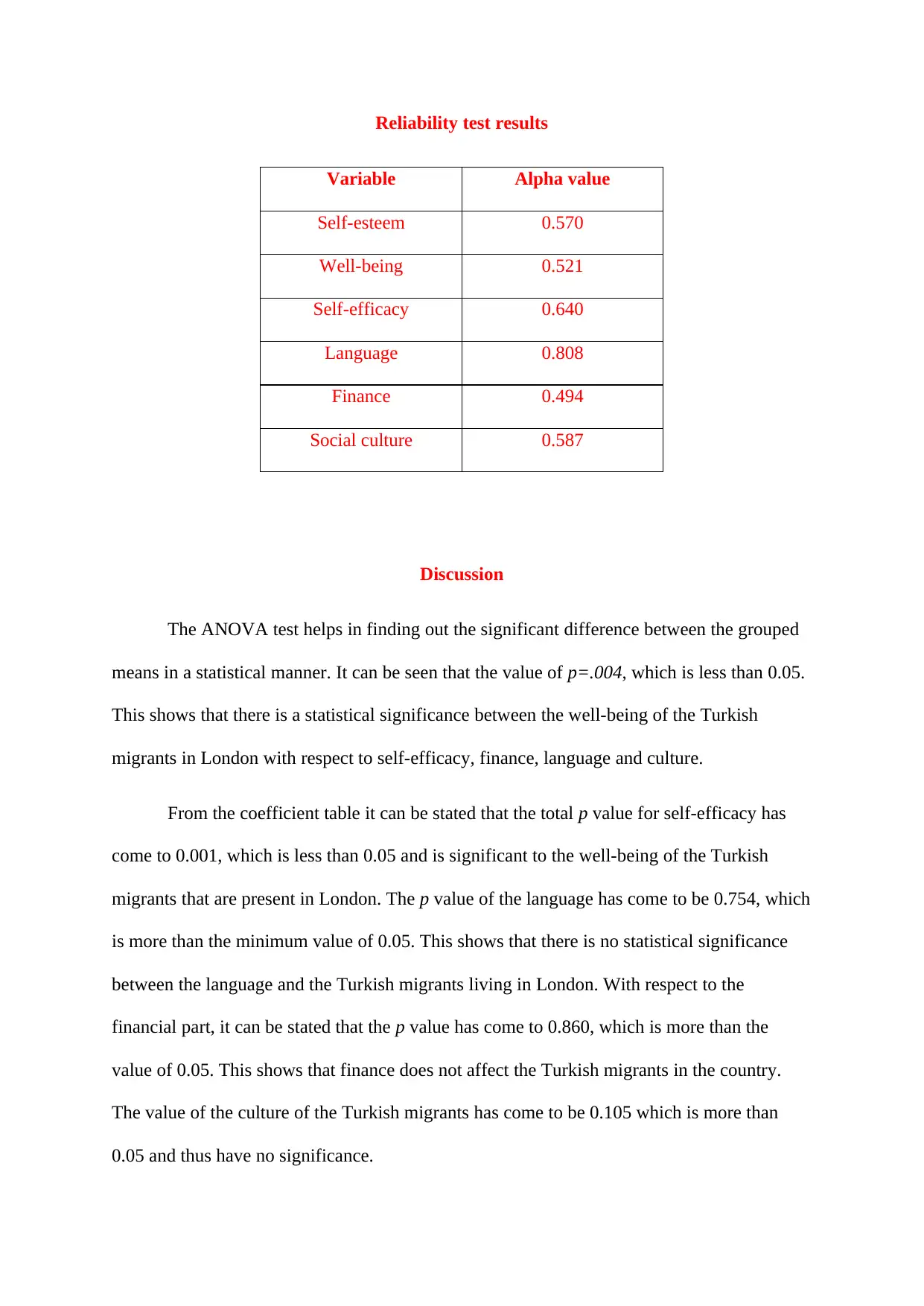
Reliability test results
Variable Alpha value
Self-esteem 0.570
Well-being 0.521
Self-efficacy 0.640
Language 0.808
Finance 0.494
Social culture 0.587
Discussion
The ANOVA test helps in finding out the significant difference between the grouped
means in a statistical manner. It can be seen that the value of p=.004, which is less than 0.05.
This shows that there is a statistical significance between the well-being of the Turkish
migrants in London with respect to self-efficacy, finance, language and culture.
From the coefficient table it can be stated that the total p value for self-efficacy has
come to 0.001, which is less than 0.05 and is significant to the well-being of the Turkish
migrants that are present in London. The p value of the language has come to be 0.754, which
is more than the minimum value of 0.05. This shows that there is no statistical significance
between the language and the Turkish migrants living in London. With respect to the
financial part, it can be stated that the p value has come to 0.860, which is more than the
value of 0.05. This shows that finance does not affect the Turkish migrants in the country.
The value of the culture of the Turkish migrants has come to be 0.105 which is more than
0.05 and thus have no significance.
Variable Alpha value
Self-esteem 0.570
Well-being 0.521
Self-efficacy 0.640
Language 0.808
Finance 0.494
Social culture 0.587
Discussion
The ANOVA test helps in finding out the significant difference between the grouped
means in a statistical manner. It can be seen that the value of p=.004, which is less than 0.05.
This shows that there is a statistical significance between the well-being of the Turkish
migrants in London with respect to self-efficacy, finance, language and culture.
From the coefficient table it can be stated that the total p value for self-efficacy has
come to 0.001, which is less than 0.05 and is significant to the well-being of the Turkish
migrants that are present in London. The p value of the language has come to be 0.754, which
is more than the minimum value of 0.05. This shows that there is no statistical significance
between the language and the Turkish migrants living in London. With respect to the
financial part, it can be stated that the p value has come to 0.860, which is more than the
value of 0.05. This shows that finance does not affect the Turkish migrants in the country.
The value of the culture of the Turkish migrants has come to be 0.105 which is more than
0.05 and thus have no significance.
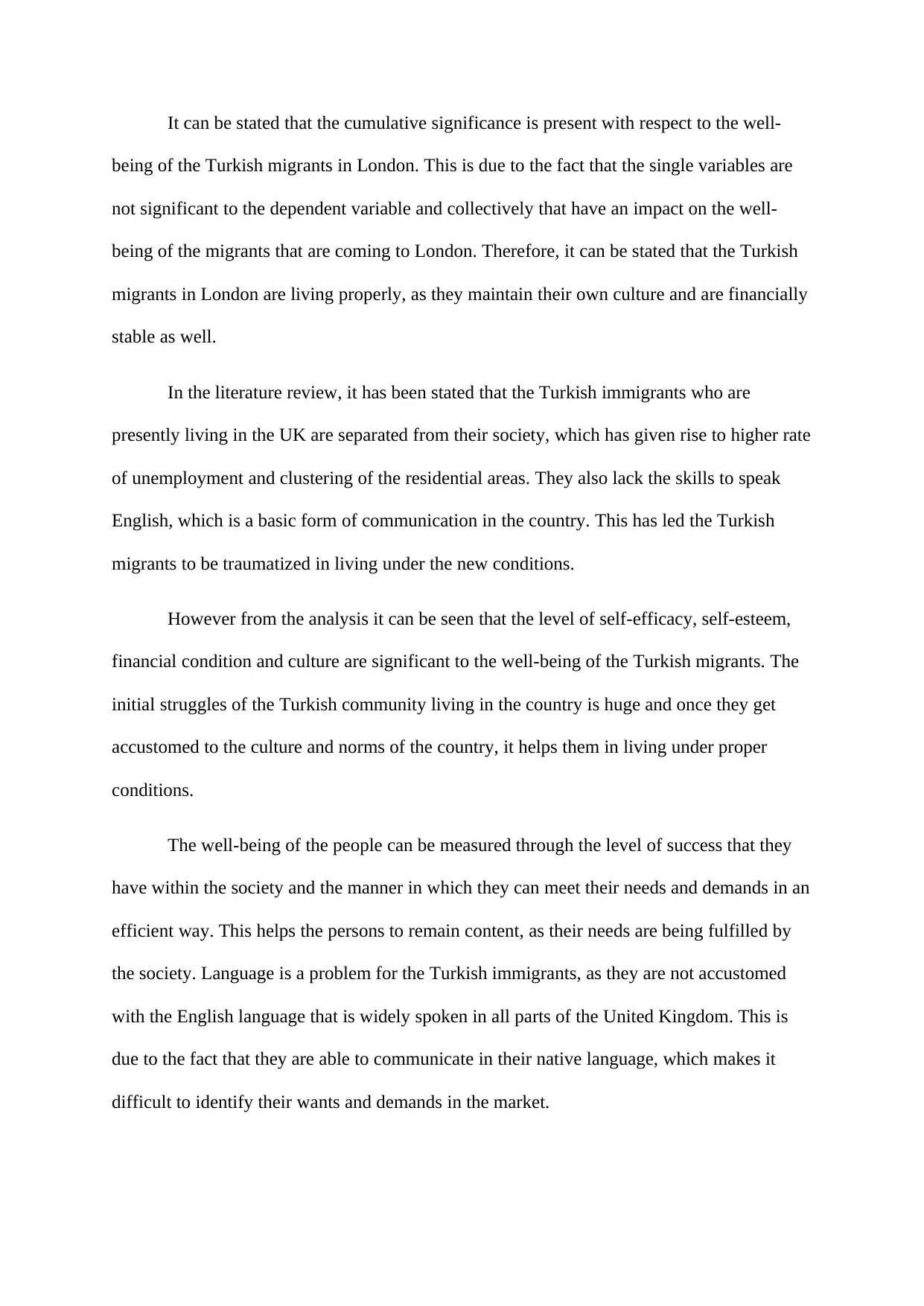
It can be stated that the cumulative significance is present with respect to the well-
being of the Turkish migrants in London. This is due to the fact that the single variables are
not significant to the dependent variable and collectively that have an impact on the well-
being of the migrants that are coming to London. Therefore, it can be stated that the Turkish
migrants in London are living properly, as they maintain their own culture and are financially
stable as well.
In the literature review, it has been stated that the Turkish immigrants who are
presently living in the UK are separated from their society, which has given rise to higher rate
of unemployment and clustering of the residential areas. They also lack the skills to speak
English, which is a basic form of communication in the country. This has led the Turkish
migrants to be traumatized in living under the new conditions.
However from the analysis it can be seen that the level of self-efficacy, self-esteem,
financial condition and culture are significant to the well-being of the Turkish migrants. The
initial struggles of the Turkish community living in the country is huge and once they get
accustomed to the culture and norms of the country, it helps them in living under proper
conditions.
The well-being of the people can be measured through the level of success that they
have within the society and the manner in which they can meet their needs and demands in an
efficient way. This helps the persons to remain content, as their needs are being fulfilled by
the society. Language is a problem for the Turkish immigrants, as they are not accustomed
with the English language that is widely spoken in all parts of the United Kingdom. This is
due to the fact that they are able to communicate in their native language, which makes it
difficult to identify their wants and demands in the market.
being of the Turkish migrants in London. This is due to the fact that the single variables are
not significant to the dependent variable and collectively that have an impact on the well-
being of the migrants that are coming to London. Therefore, it can be stated that the Turkish
migrants in London are living properly, as they maintain their own culture and are financially
stable as well.
In the literature review, it has been stated that the Turkish immigrants who are
presently living in the UK are separated from their society, which has given rise to higher rate
of unemployment and clustering of the residential areas. They also lack the skills to speak
English, which is a basic form of communication in the country. This has led the Turkish
migrants to be traumatized in living under the new conditions.
However from the analysis it can be seen that the level of self-efficacy, self-esteem,
financial condition and culture are significant to the well-being of the Turkish migrants. The
initial struggles of the Turkish community living in the country is huge and once they get
accustomed to the culture and norms of the country, it helps them in living under proper
conditions.
The well-being of the people can be measured through the level of success that they
have within the society and the manner in which they can meet their needs and demands in an
efficient way. This helps the persons to remain content, as their needs are being fulfilled by
the society. Language is a problem for the Turkish immigrants, as they are not accustomed
with the English language that is widely spoken in all parts of the United Kingdom. This is
due to the fact that they are able to communicate in their native language, which makes it
difficult to identify their wants and demands in the market.
⊘ This is a preview!⊘
Do you want full access?
Subscribe today to unlock all pages.

Trusted by 1+ million students worldwide
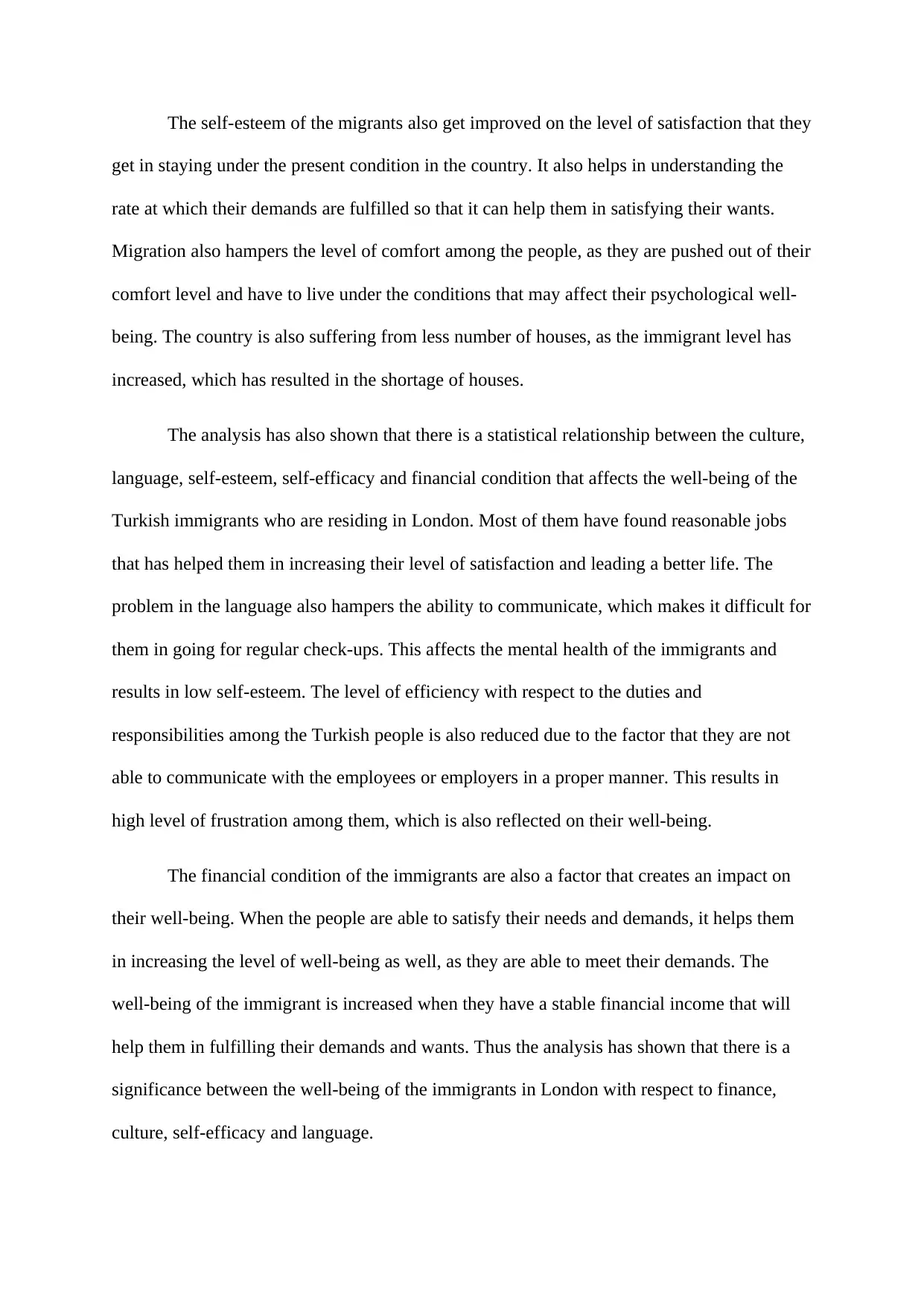
The self-esteem of the migrants also get improved on the level of satisfaction that they
get in staying under the present condition in the country. It also helps in understanding the
rate at which their demands are fulfilled so that it can help them in satisfying their wants.
Migration also hampers the level of comfort among the people, as they are pushed out of their
comfort level and have to live under the conditions that may affect their psychological well-
being. The country is also suffering from less number of houses, as the immigrant level has
increased, which has resulted in the shortage of houses.
The analysis has also shown that there is a statistical relationship between the culture,
language, self-esteem, self-efficacy and financial condition that affects the well-being of the
Turkish immigrants who are residing in London. Most of them have found reasonable jobs
that has helped them in increasing their level of satisfaction and leading a better life. The
problem in the language also hampers the ability to communicate, which makes it difficult for
them in going for regular check-ups. This affects the mental health of the immigrants and
results in low self-esteem. The level of efficiency with respect to the duties and
responsibilities among the Turkish people is also reduced due to the factor that they are not
able to communicate with the employees or employers in a proper manner. This results in
high level of frustration among them, which is also reflected on their well-being.
The financial condition of the immigrants are also a factor that creates an impact on
their well-being. When the people are able to satisfy their needs and demands, it helps them
in increasing the level of well-being as well, as they are able to meet their demands. The
well-being of the immigrant is increased when they have a stable financial income that will
help them in fulfilling their demands and wants. Thus the analysis has shown that there is a
significance between the well-being of the immigrants in London with respect to finance,
culture, self-efficacy and language.
get in staying under the present condition in the country. It also helps in understanding the
rate at which their demands are fulfilled so that it can help them in satisfying their wants.
Migration also hampers the level of comfort among the people, as they are pushed out of their
comfort level and have to live under the conditions that may affect their psychological well-
being. The country is also suffering from less number of houses, as the immigrant level has
increased, which has resulted in the shortage of houses.
The analysis has also shown that there is a statistical relationship between the culture,
language, self-esteem, self-efficacy and financial condition that affects the well-being of the
Turkish immigrants who are residing in London. Most of them have found reasonable jobs
that has helped them in increasing their level of satisfaction and leading a better life. The
problem in the language also hampers the ability to communicate, which makes it difficult for
them in going for regular check-ups. This affects the mental health of the immigrants and
results in low self-esteem. The level of efficiency with respect to the duties and
responsibilities among the Turkish people is also reduced due to the factor that they are not
able to communicate with the employees or employers in a proper manner. This results in
high level of frustration among them, which is also reflected on their well-being.
The financial condition of the immigrants are also a factor that creates an impact on
their well-being. When the people are able to satisfy their needs and demands, it helps them
in increasing the level of well-being as well, as they are able to meet their demands. The
well-being of the immigrant is increased when they have a stable financial income that will
help them in fulfilling their demands and wants. Thus the analysis has shown that there is a
significance between the well-being of the immigrants in London with respect to finance,
culture, self-efficacy and language.
Paraphrase This Document
Need a fresh take? Get an instant paraphrase of this document with our AI Paraphraser
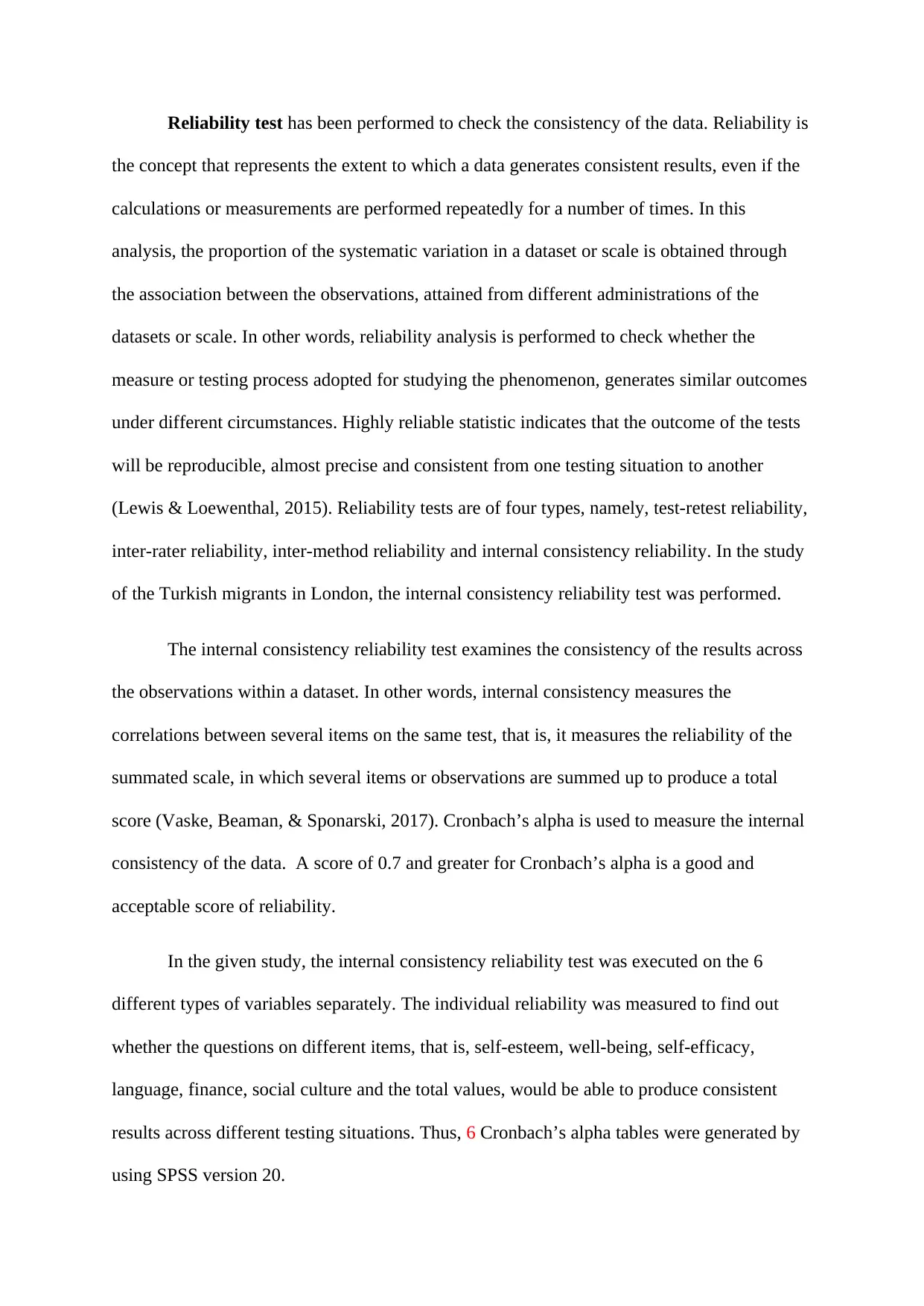
Reliability test has been performed to check the consistency of the data. Reliability is
the concept that represents the extent to which a data generates consistent results, even if the
calculations or measurements are performed repeatedly for a number of times. In this
analysis, the proportion of the systematic variation in a dataset or scale is obtained through
the association between the observations, attained from different administrations of the
datasets or scale. In other words, reliability analysis is performed to check whether the
measure or testing process adopted for studying the phenomenon, generates similar outcomes
under different circumstances. Highly reliable statistic indicates that the outcome of the tests
will be reproducible, almost precise and consistent from one testing situation to another
(Lewis & Loewenthal, 2015). Reliability tests are of four types, namely, test-retest reliability,
inter-rater reliability, inter-method reliability and internal consistency reliability. In the study
of the Turkish migrants in London, the internal consistency reliability test was performed.
The internal consistency reliability test examines the consistency of the results across
the observations within a dataset. In other words, internal consistency measures the
correlations between several items on the same test, that is, it measures the reliability of the
summated scale, in which several items or observations are summed up to produce a total
score (Vaske, Beaman, & Sponarski, 2017). Cronbach’s alpha is used to measure the internal
consistency of the data. A score of 0.7 and greater for Cronbach’s alpha is a good and
acceptable score of reliability.
In the given study, the internal consistency reliability test was executed on the 6
different types of variables separately. The individual reliability was measured to find out
whether the questions on different items, that is, self-esteem, well-being, self-efficacy,
language, finance, social culture and the total values, would be able to produce consistent
results across different testing situations. Thus, 6 Cronbach’s alpha tables were generated by
using SPSS version 20.
the concept that represents the extent to which a data generates consistent results, even if the
calculations or measurements are performed repeatedly for a number of times. In this
analysis, the proportion of the systematic variation in a dataset or scale is obtained through
the association between the observations, attained from different administrations of the
datasets or scale. In other words, reliability analysis is performed to check whether the
measure or testing process adopted for studying the phenomenon, generates similar outcomes
under different circumstances. Highly reliable statistic indicates that the outcome of the tests
will be reproducible, almost precise and consistent from one testing situation to another
(Lewis & Loewenthal, 2015). Reliability tests are of four types, namely, test-retest reliability,
inter-rater reliability, inter-method reliability and internal consistency reliability. In the study
of the Turkish migrants in London, the internal consistency reliability test was performed.
The internal consistency reliability test examines the consistency of the results across
the observations within a dataset. In other words, internal consistency measures the
correlations between several items on the same test, that is, it measures the reliability of the
summated scale, in which several items or observations are summed up to produce a total
score (Vaske, Beaman, & Sponarski, 2017). Cronbach’s alpha is used to measure the internal
consistency of the data. A score of 0.7 and greater for Cronbach’s alpha is a good and
acceptable score of reliability.
In the given study, the internal consistency reliability test was executed on the 6
different types of variables separately. The individual reliability was measured to find out
whether the questions on different items, that is, self-esteem, well-being, self-efficacy,
language, finance, social culture and the total values, would be able to produce consistent
results across different testing situations. Thus, 6 Cronbach’s alpha tables were generated by
using SPSS version 20.
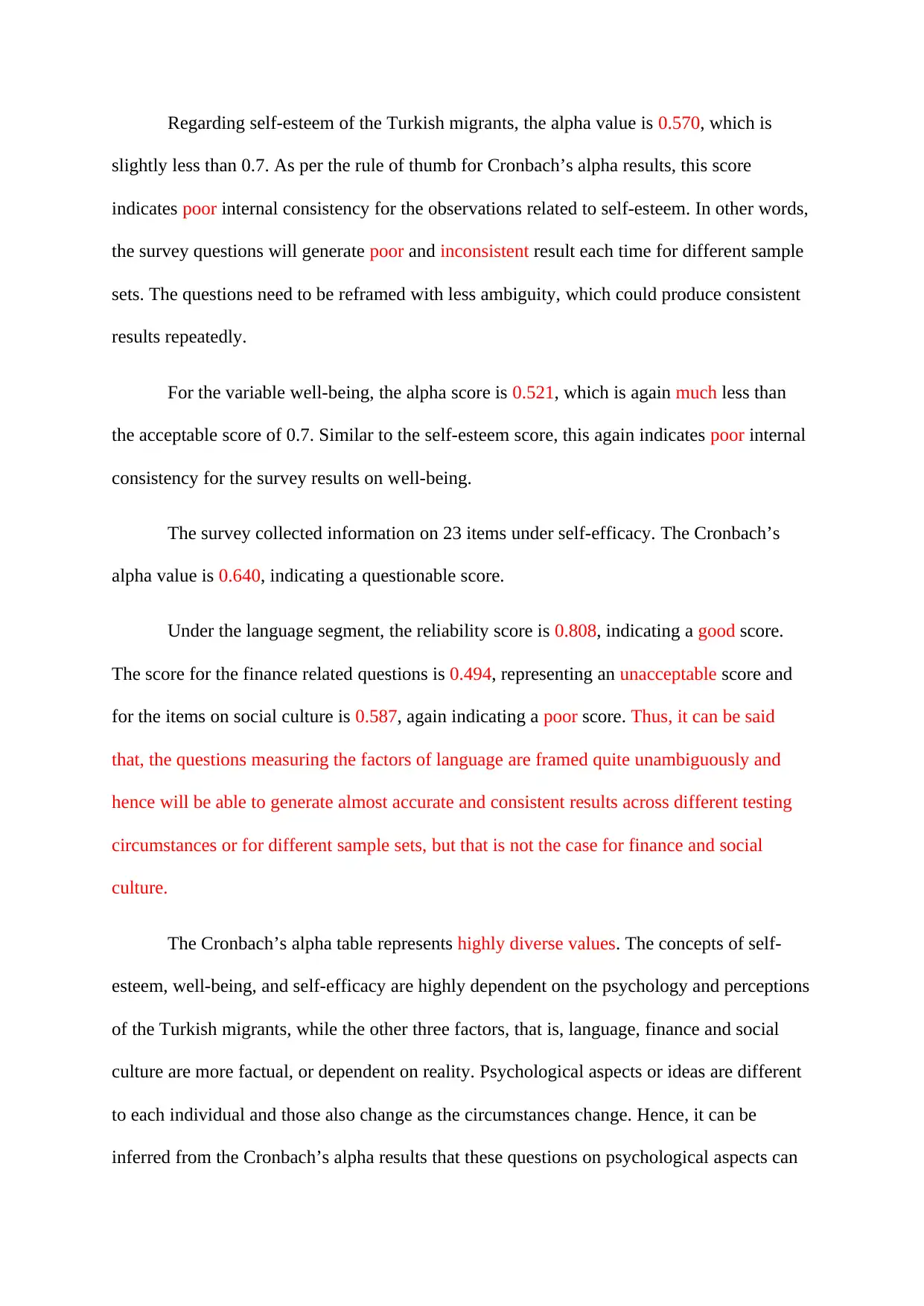
Regarding self-esteem of the Turkish migrants, the alpha value is 0.570, which is
slightly less than 0.7. As per the rule of thumb for Cronbach’s alpha results, this score
indicates poor internal consistency for the observations related to self-esteem. In other words,
the survey questions will generate poor and inconsistent result each time for different sample
sets. The questions need to be reframed with less ambiguity, which could produce consistent
results repeatedly.
For the variable well-being, the alpha score is 0.521, which is again much less than
the acceptable score of 0.7. Similar to the self-esteem score, this again indicates poor internal
consistency for the survey results on well-being.
The survey collected information on 23 items under self-efficacy. The Cronbach’s
alpha value is 0.640, indicating a questionable score.
Under the language segment, the reliability score is 0.808, indicating a good score.
The score for the finance related questions is 0.494, representing an unacceptable score and
for the items on social culture is 0.587, again indicating a poor score. Thus, it can be said
that, the questions measuring the factors of language are framed quite unambiguously and
hence will be able to generate almost accurate and consistent results across different testing
circumstances or for different sample sets, but that is not the case for finance and social
culture.
The Cronbach’s alpha table represents highly diverse values. The concepts of self-
esteem, well-being, and self-efficacy are highly dependent on the psychology and perceptions
of the Turkish migrants, while the other three factors, that is, language, finance and social
culture are more factual, or dependent on reality. Psychological aspects or ideas are different
to each individual and those also change as the circumstances change. Hence, it can be
inferred from the Cronbach’s alpha results that these questions on psychological aspects can
slightly less than 0.7. As per the rule of thumb for Cronbach’s alpha results, this score
indicates poor internal consistency for the observations related to self-esteem. In other words,
the survey questions will generate poor and inconsistent result each time for different sample
sets. The questions need to be reframed with less ambiguity, which could produce consistent
results repeatedly.
For the variable well-being, the alpha score is 0.521, which is again much less than
the acceptable score of 0.7. Similar to the self-esteem score, this again indicates poor internal
consistency for the survey results on well-being.
The survey collected information on 23 items under self-efficacy. The Cronbach’s
alpha value is 0.640, indicating a questionable score.
Under the language segment, the reliability score is 0.808, indicating a good score.
The score for the finance related questions is 0.494, representing an unacceptable score and
for the items on social culture is 0.587, again indicating a poor score. Thus, it can be said
that, the questions measuring the factors of language are framed quite unambiguously and
hence will be able to generate almost accurate and consistent results across different testing
circumstances or for different sample sets, but that is not the case for finance and social
culture.
The Cronbach’s alpha table represents highly diverse values. The concepts of self-
esteem, well-being, and self-efficacy are highly dependent on the psychology and perceptions
of the Turkish migrants, while the other three factors, that is, language, finance and social
culture are more factual, or dependent on reality. Psychological aspects or ideas are different
to each individual and those also change as the circumstances change. Hence, it can be
inferred from the Cronbach’s alpha results that these questions on psychological aspects can
⊘ This is a preview!⊘
Do you want full access?
Subscribe today to unlock all pages.

Trusted by 1+ million students worldwide
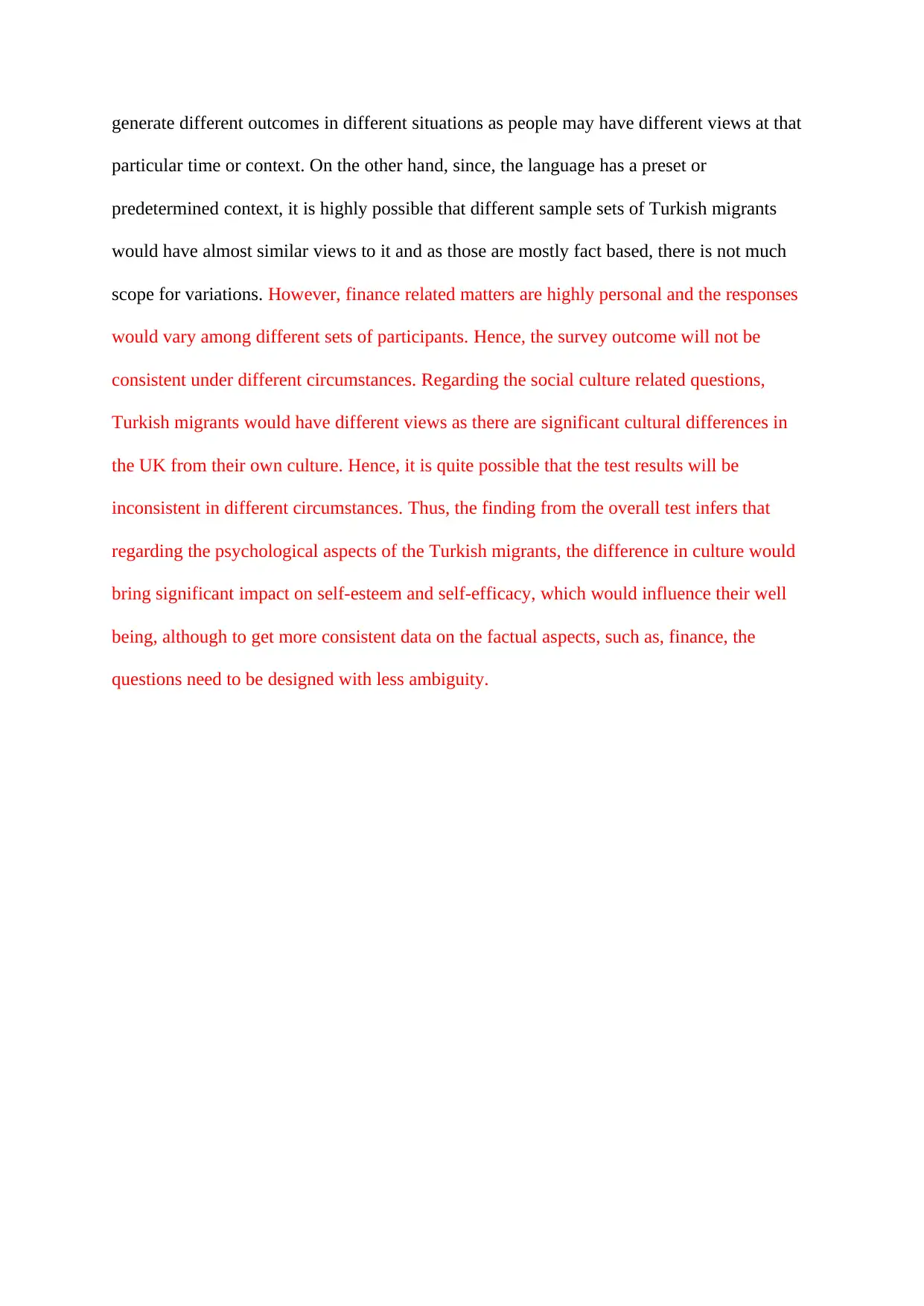
generate different outcomes in different situations as people may have different views at that
particular time or context. On the other hand, since, the language has a preset or
predetermined context, it is highly possible that different sample sets of Turkish migrants
would have almost similar views to it and as those are mostly fact based, there is not much
scope for variations. However, finance related matters are highly personal and the responses
would vary among different sets of participants. Hence, the survey outcome will not be
consistent under different circumstances. Regarding the social culture related questions,
Turkish migrants would have different views as there are significant cultural differences in
the UK from their own culture. Hence, it is quite possible that the test results will be
inconsistent in different circumstances. Thus, the finding from the overall test infers that
regarding the psychological aspects of the Turkish migrants, the difference in culture would
bring significant impact on self-esteem and self-efficacy, which would influence their well
being, although to get more consistent data on the factual aspects, such as, finance, the
questions need to be designed with less ambiguity.
particular time or context. On the other hand, since, the language has a preset or
predetermined context, it is highly possible that different sample sets of Turkish migrants
would have almost similar views to it and as those are mostly fact based, there is not much
scope for variations. However, finance related matters are highly personal and the responses
would vary among different sets of participants. Hence, the survey outcome will not be
consistent under different circumstances. Regarding the social culture related questions,
Turkish migrants would have different views as there are significant cultural differences in
the UK from their own culture. Hence, it is quite possible that the test results will be
inconsistent in different circumstances. Thus, the finding from the overall test infers that
regarding the psychological aspects of the Turkish migrants, the difference in culture would
bring significant impact on self-esteem and self-efficacy, which would influence their well
being, although to get more consistent data on the factual aspects, such as, finance, the
questions need to be designed with less ambiguity.
Paraphrase This Document
Need a fresh take? Get an instant paraphrase of this document with our AI Paraphraser

References
Lewis, C. A., & Loewenthal, K. (2015). An introduction to psychological tests and scales.
Psychology Press.
Vaske, J. J., Beaman, J., & Sponarski, C. C. (2017). Rethinking internal consistency in
Cronbach's Alpha. Leisure Sciences, 39(2), 163-173.
Lewis, C. A., & Loewenthal, K. (2015). An introduction to psychological tests and scales.
Psychology Press.
Vaske, J. J., Beaman, J., & Sponarski, C. C. (2017). Rethinking internal consistency in
Cronbach's Alpha. Leisure Sciences, 39(2), 163-173.
1 out of 8
Related Documents
Your All-in-One AI-Powered Toolkit for Academic Success.
+13062052269
info@desklib.com
Available 24*7 on WhatsApp / Email
![[object Object]](/_next/static/media/star-bottom.7253800d.svg)
Unlock your academic potential
Copyright © 2020–2025 A2Z Services. All Rights Reserved. Developed and managed by ZUCOL.





